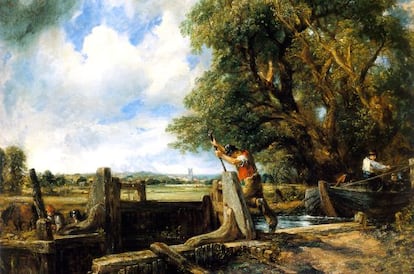Baroness puts up Constable for sale
Carmen Cervera to sell off valuable landscape; "I need cash," she says

It seems that not even Spain's super-rich have been left untouched by the economic crisis. Art collector and philanthropist Carmen Cervera, to whom the multi-million-euro Carmen Thyssen-Bornemisza art collection belongs, has decided to auction off one of the jewels in her possession, The Lock (1824) by British landscape artist John Constable, because, she says, she needs the money.
"The crisis affects everyone. Collectors included. I need cash," the baroness told a handful of journalists at a select restaurant in downtown Madrid on Tuesday.
The painting, which is already in London, will go under the hammer on July 3. The price has been set at 21 million pounds (26 million euros), though the baroness hopes the work will go for more - perhaps around 50 million euros. The Lock is one of the few Constable landscapes in private hands.
Saddened at having to let go of a painting that she and her late husband, Baron Hans Heinrich Thyssen-Bornemisza, acquired a year after their marriage in 1990 for $10.8 million, the baroness said she wasn't about to start selling off all her major possessions one by one. "I didn't want to touch the Impressionists, nor the Expressionists, but now I have been left with no alternative," she said.
The only opposition Came from the British curator Norman Rosenthal and my daughter-in-law"
One thing remains clear, however: the owner of one of the most valuable art collections in the world sees it as easier to dispense with a Constable landscape than any of the mansions she owns in Madrid, the Costa Brava, Málaga or Switzerland.
Before the painting was flown off to the UK, Cervera revealed her plans to the board of the Thyssen-Bornemisza Museum on Monday afternoon.
The president of the institution, Minister for Education, Culture and Sport José Ignacio Wert, said he received the message, but expressed little concern about the news - in any case he didn't announce plans for the state to exercise its right to buy.
"The only opposition," the baroness said, "came from [British curator] Norman Rosenthal and [her late husband's daughter] Francesca Thyssen, who expressed their displeasure via text message." Thyssen director Guillermo Solano said on Tuesday that the deal was unquestionable. "Carmen can sell up to eight percent of the deposited value [the entire collection is valued at 800 million dollars]. The Constable would amount to 2.4 percent."
Museum sources said the baroness' need for liquidity had nothing to do with the end of its collaboration with troubled savings bank Bankia, which until now had co-funded its big exhibitions.
Thyssen chiefs have not yet found sponsors for the forthcoming Edward Hopper show, its main event of the season. "But the Thyssen Museum is not in debt. The books are balanced perfectly," said Solana.
Neither, the baroness said, does her need for funds have anything to do with her son having filed new lawsuits against her. In March a Madrid provincial court shelved a case brought by Borja Thyssen-Bornemisza against her alleged appropriation of two paintings that he claims belong to him. "He cannot ask for more. Only when I die," she said.
This is not the first painting the baroness has sold from her collection. On Tuesday she admitted that a while ago an American collector had purchased one of the five canvases by US Impressionist Childe Hassam in her possession. Paris Street Scene, Autumn was an oil painting that belonged to her late husband that had hung in his Villa Favorita house in Lugano. The baroness declined to specify the price she received, only classifying it as a "minor" deal.
Tu suscripción se está usando en otro dispositivo
¿Quieres añadir otro usuario a tu suscripción?
Si continúas leyendo en este dispositivo, no se podrá leer en el otro.
FlechaTu suscripción se está usando en otro dispositivo y solo puedes acceder a EL PAÍS desde un dispositivo a la vez.
Si quieres compartir tu cuenta, cambia tu suscripción a la modalidad Premium, así podrás añadir otro usuario. Cada uno accederá con su propia cuenta de email, lo que os permitirá personalizar vuestra experiencia en EL PAÍS.
¿Tienes una suscripción de empresa? Accede aquí para contratar más cuentas.
En el caso de no saber quién está usando tu cuenta, te recomendamos cambiar tu contraseña aquí.
Si decides continuar compartiendo tu cuenta, este mensaje se mostrará en tu dispositivo y en el de la otra persona que está usando tu cuenta de forma indefinida, afectando a tu experiencia de lectura. Puedes consultar aquí los términos y condiciones de la suscripción digital.








































